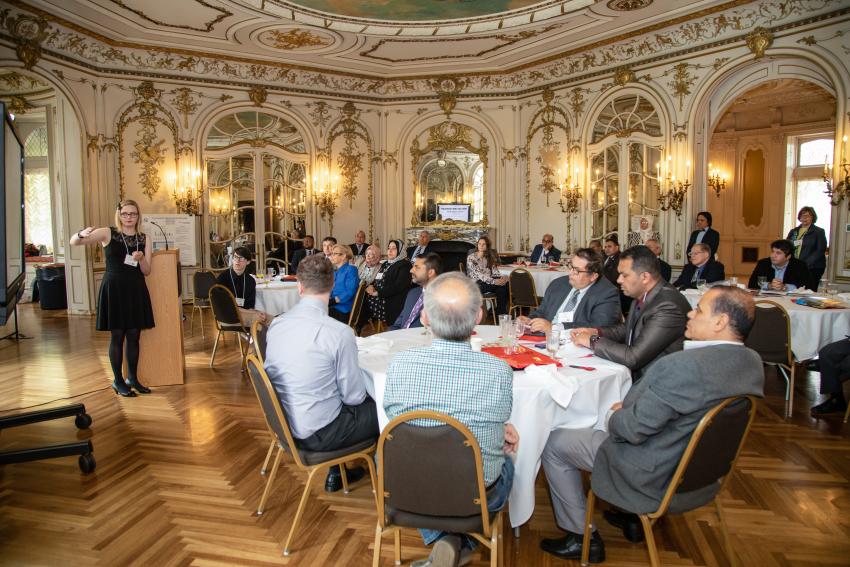Q&A with Dr. Reda Abouserie

Student presents capstone to delegates, and Arcadia faculty and staff.
On April 30, Dr. Reda Abouserie, Chief of Party, USAID-Supported STEM Teacher Education and School Strengthening Activity Project and former First Deputy to the Minister of Education in Egypt, along with 15 other delegates from Egypt, visited the campus as part of a Philadelphia tour funded by a USAID activity to strengthen STEM schools and teacher education in Egypt, which was subcontracted to, Arcadia, Temple, and Drexel universities, among others.
What brings you to Arcadia?
It all started in Philadelphia, in 2011, with a similar study tour to visit STEM [Science, Technology, Engineering, and Mathematics] schools in Philadelphia. At that time, the purpose was to introduce STEM education and establish STEM schools in Egypt.
We met with Joe Merlino [president of 21st Century Partnership for STEM Education] during the visit and before the start of first USAID-funded project, Egypt STEM Schools Project – ESSP. At the time, the Ministry of Education made the decision to establish the first STEM school in Egypt. With help from USAID, instead of establishing three to five schools, we ended up establishing 14 schools. That has enabled the Ministry of Education and USAID to join together in another project to enhance and to design a new activity focusing on the preparation of STEM-specialized teachers, because this is a new type of education that requires specially prepared teachers.
How will this grant and collaboration benefit universities both in Egypt and the U.S.?
It’s a partnership between a number of universities—five universities in Egypt and a number of universities in the United States, including Arcadia. From our side, I’m sure we will benefit from the experience of Arcadia and other universities to establish a strong program for teacher preparation in Egypt. We will benefit a lot from these programs at Arcadia and the other universities as well.
What do you think of the day so far?
I’m impressed with the capstones because it’s exactly the same philosophy that we are implementing in the schools in Egypt, and I’m really impressed by the presentations of the students.
Is there anything about the capstones in particular?
Well, the depth and the scientific approach adopted is the approach and philosophy that we are using in the STEM high schools in Egypt. We’ll continue this approach in the new teacher preparation programs that focus on the STEM education in Egypt.
What is the objective of this tour?
The objective of the tour itself is really to explore the STEM teacher preparation programs. But also we are looking at the labs students are using—this is very important—and the experience of students here and at other universities, because we are going to establish similar programs in Egypt. Therefore, we want to see all components of the program—not just the training or the theoretical part of it, but also the practical application.
Do you see this project as a multipart process?
The cooperation and partnership will continue for another four years between universities in Egypt and the United States. The next step is creating and developing the program itself, and implementing it in Egypt. Then, we will use feedback to continue the partnership.
What does implementation look like?
We’re starting the program itself in the universities, which takes a lot of time, because there is a process in Egypt that you have to follow to establish a new program. So from our side, the Egyptian side has this responsibility, and the American side assists with the technical parts of establishing the program. Arcadia and other universities will help in enhancing and developing the capacities of the university faculties in Egypt.
What do you hope to see in the near future in Egypt with these programs?
I used to describe the first STEM-related USAID project (ESSP) as “Welcome to the Dream.” We are calling this new one “Welcome to the Second Part of the Dream.” So, my hope again is that, in a few years, we return again to Arcadia and all these great universities as a result of another new program. To us, it’s just achieving a dream and then starting another phase of it.
This interview is made possible by the support of the American People through the United States Agency for International Development (USAID.) The contents of this interview are the sole responsibility of Arcadia University and do not necessarily reflect the views of USAID or the United States Government.


